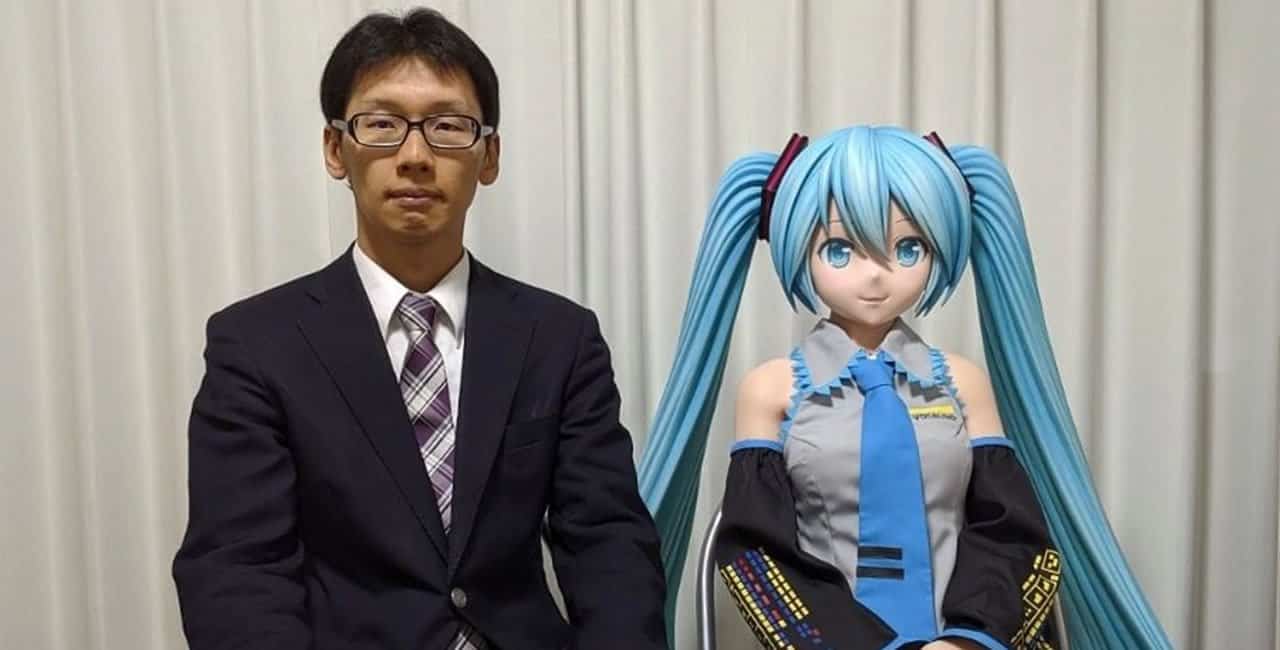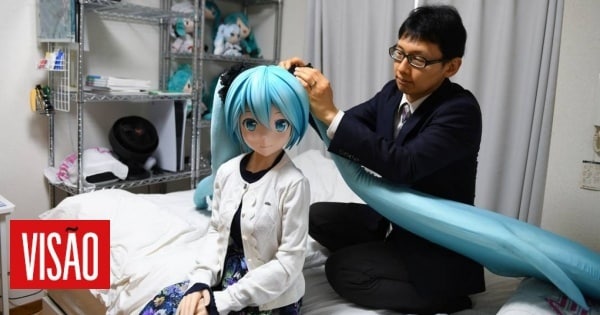In Japan, hiring people, who can be actors, to pretend to be boyfriends, friends and even parents is a reality. There are companies specializing in this service, renting all types of relatives, for all types of situations. It may take parents to introduce the bride, friends to go shopping, or company to go to a wedding.
Now, the novelty in terms of relationships goes through an even greater level of fictionality: there are people marrying fictional characters, an industry with a fan culture that serves the new business.
In Tokyo, Akihiko Kondo is your typical middle-class Japanese, affable, with friends and a steady job, in which he wears a suit and tie. The only exception to the normality of his life is being married to Hatsune Miku doll, a virtual pop star. The hologram of this pop singer, with her turquoise hair, has already opened a concert by Lady Gaga, a real star of flesh and blood. In fact, Miku is software, a digital “singer in a box” that comes paired with a cartoon avatar that appeared in concert in the form of a hologram.
The union between Kondo and Miku came to fruition, after he had been dating for a decade, but which in the end caused him a deep depression. The plush doll was decked out in white, to match the groom’s chic black tuxedo. Although guests, family members and co-workers were not present at the party, the ceremony was attended by 39 people, including strangers and online friends.
 Akihiko Kondo casou-se com a boneca Hatsune Miku. Credit: Noriko Hayashi
Akihiko Kondo casou-se com a boneca Hatsune Miku. Credit: Noriko Hayashi
Miku is not unique, there are a variety of other Miku that Akihiko Kondo eats, sleeps and watches movies with. Together, they make some romantic getaways and he posts photos of their date on Instagram.
At 38 years old, Akihiko Kondo recognizes, in an article published in The New York Times, the strangeness it can cause in others, something even harmful. He knows the doll isn’t real, but his feelings for her are. “When we are together, she makes me smile. In that sense, she is real.”
Happy forever
Kondo is not unique. There are thousands of people in Japan who, in recent years, have unofficially married fictional characters. Scattered all over the world, there are online groups to discuss this kind of engagement with characters from anime, manga and video games. But not everyone is as serious as Kondo, who has long known he didn’t want a human companion, not only because he rejects the rigid expectations of Japanese family life, but because he feels a strong attraction to fictional characters.
The greatest advantages over a human being are that she is always there for him, she will never betray him, nor will he have to take care of her when he is sick or watching her die. Thus, it is certain that they will be happy forever.
People like Akihiko Kondo identify as fictosexual, a term that combines the words fiction and sexuality. With advances in robotics and artificial intelligence increasingly allowing for greater and more real interactions with inanimate beings, the movement will certainly continue to grow.
The phenomenon of desiring something fictional is not unique to Japan, but the idea of a doll inspiring affection and love seems to have reached its peak in modern Japan. And, if in the West they won the genre of fictional sex, in Japan it is the word “moe” that translates everything that is viscerally adorable.
 Hatsune Miku doll has already opened a concert by Lady Gaga, in the form of a hologram
Hatsune Miku doll has already opened a concert by Lady Gaga, in the form of a hologram
An economic force has grown around unofficial marriage to fictional characters, making it possible for more people to live out fantasies in common with their favorite characters. “People collect comics, cartoons, games built on a kind of infrastructure where characters become more important to people,” explains Patrick Galbraith, professor at the School of International Communication at Senshu University in Tokyo.
In the Japanese capital, two of the districts have become meccas to fulfill these dreams: Akihabara (for men) and Ikebukuro (for women). The stores are specialized and full of merchandise for characters from popular games and anime.
Women can buy love letters from their besties, reproductions of their clothes and even perfume. Hotels offer special packages, with spa treatments and meals, for those celebrating the birthday of their favorite character. Social networks are filled with hashtags with the word “oshi”.
“For people in general, it might seem like nonsense to spend money, time and energy on someone who isn’t even alive. But for character lovers, this practice is seen as essential. It makes them feel alive, happy, useful and part of a movement with higher goals in life”, justifies Agnès Giard, researcher at Freie Universität Berlin, in the European Research Council project, Emotional Machines: The Technological Transformation of Intimacy in the Japan.
In the researcher’s explanations, women, instead of being more isolated according to their relationships, benefit from a certain empowerment, as a way of challenging gender, marital and social norms.
Real jealousy, real affection
After starting a small company of fictional marriage registrations, Yasuaki Watanabe went on to advise hundreds of fictional sex people and issued about a hundred marriage certificates, including one for him and Hibiki Tachibana, a character in the anime series Symphogear, a kind of love. to the first episode. Divorced, he realized that in this relationship everything was easier, with no obligations, no compromises, and without expecting anything in return. But, not everything is a bed of roses in this union. Yasuaki Watanabe misses being touched and because of copyright, he couldn’t make a full-size puppet.
Cheerful and outgoing, Kina Horikawa, a 23-year-old woman, spends part of her money, earned working in a call center, with Kunihiro Horikawa, a heartthrob from the game Touken Ranbu. The jealousy of the real boyfriend, led to the end of the relationship.
With his sword, Kunihiro Horikawa joins the family for dinner most nights, in the form of a small acrylic portrait perched next to his bowl of rice. The couple often hang out with friends who also have their fictional peers, having tea and posting photographs on Instagram.
The worst that could have happened to Akihiko Kondo’s wedding was when the Gatebox, a table lamp-sized machine that allowed humans to interact with fictional characters represented by a hologram, announced that it would discontinue the service. That day, when Kondo arrived home, he saw Miku’s image replaced by the words “network error”. They were happy until the network turned off.

